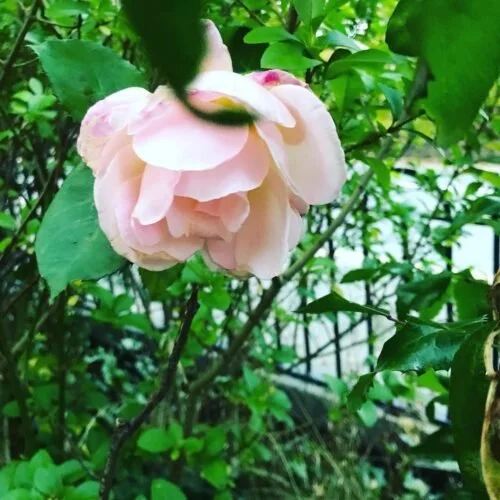Living with dignity - Blog Post | April 19th, 2021
Letty McHugh reflects on why it’s imperative you listen to disabled voices before spouting off about assisted dying.
The other week I was scrolling down Instagram when, I came across the headline of an article someone I used to follow had just published in a national newspaper. It was about assisted dying and her friend who lived with MS, before she chose to end her life. For me scrolling on my phone in bed it felt like a gut punch. I’m here trying not to think about the ways my degenerative illness can degenerate. Trying not to think about how bad things can get, and this author, who doesn’t live with MS is casually throwing the worst it can get around like a grenade, like MS and the desire to die are one in the same, like no one living with this illness could be on the other side of a social media stream.
I kept feeling angry for weeks. This isn’t like me at all. I’m mad that she wrote it. I’m mad that every article I ever see written about MS is by a friend or family member of someone with MS talking about how sad it is, and never by someone living with this illness. I’m mad that MS has somehow become the poster illness of assisted suicide.
I didn’t read this specific article, I know that’s like the cardinal sin of unjustified internet outrage, but I would be prepared to bet a large amount of money that I could guess how it goes. It opens with the story of this friend, the friend who is sick, sick with MS, the illness that we all know is one of the saddest and most tragic illnesses it is possible to have. I imagine the article then goes on to highlight how vibrant she was, how interesting and full of life, a surprise of course to the reader that anyone with such a sad, sad illness would ever be happy, ever dance or laugh or get out of bed. I’d guess we get a few anecdotes to convince the naturally sceptical audience that yes as unlikely as it seems this sick person did get out of bed sometimes, honest.
Then we probably hear about an increase in visible symptoms, knowing MS as I do, I’ll venture a guess at a spasm, or slurred speech, trouble swallowing, something like that, and then, the sad decline. The line “my excellent friend was disappearing before our eyes” is probably used, and then inevitably, understandably, she chooses to die. If the article isn’t this then it’s a miracle, because that’s what every other article ever written about MS says. This is the story of MS that exists in the public consciousness.
That vision of MS, the one that people have before I meet them, that I have no control over, it merges with the way that people see me. It’s toxic, it creates barriers, it’s a constant pain in my arse.
Whenever MS is dealt with on TV, we either get an awkward reference to the assisted dying debate or a lazy shorthand to explain why a character is sad. Allowing for the fact I deliberately avoid depictions of MS on TV because it’s always rubbish, here’s a list of a few stand out moments.
1. On Holby City in the late 00’s Doctor Elliot Hope’s wife appears as a feisty career woman who uses a cane. We learn she needs the cane because she has MS, within 6 months she’s gone to a Swiss clinic.
2. On Law and Order SVU a teenager is forced into sex work, ‘How did this happen, where are your parents?’ asks Detective Olivia Benson “They are dead, I was living with my Aunt who has MS.”
3. On Jo Brand’s Hospital sit com there is an older Lady on the ward, she has MS, she’s waiting for her son to pick her up, she’s going away next week. Where? Switzerland. Have a good trip. Hahahaha.
4. Sex Education, even wonderful, funny, diverse, queer friendly, sex positive Sex Education betrayed me with this exchange “I kiss nerdy boys when I’m sad.” “Why are you sad Ruby?” “My Dad has MS.”. We Never see the MS Dad of course. On this most progressive, most inclusive of shows we get a full chalk board diagram about anal douching but one visibly disabled character who becomes the roadblock between the main couple and a lifetime of happiness. It makes me sad. Not kiss nerdy boys, let a child I’m legally responsible for get sex trafficked, book myself into an assisted dying clinic sad, but still pretty sad. When I was first diagnosed with MS the only place I’d ever heard of it was that awful Holby City storyline.
From a series of photos: ‘joy in unexpected places’ by Letty McHugh
The constant depiction of MS as a fate worse than death, it has such a real impact on the lives of people living with it. It makes diagnosis so much harder than it needs to be. I read this latest article on the nine year anniversary of my diagnosis and it still shook me to my core, imagine I had seen it the day after, broken and clueless and trying to imagine that life was still possible, nothing insulating me from the public idea that a life with MS isn’t worth living.
There’s also the sad version of MS which is annoying, where people tilt their heads and tell you it’s okay for you to be sad, just you know, not right now because that would be super inconvenient, and stop inviting you to important work related meetings, because you have enough to deal with. Then there’s the equally annoying cousin of sad MS, brave MS, where people tell you what an inspiration you are, no really, I wouldn’t be able to get out of bed if I were you. The inspiration of course is a side effect of the sadness, it’s inspiring that I go on when my life is so very sad.
Certain sections of the online MS community describe themselves as ‘MS Warriors’, and I guess that’s fine, God Speed to you if that’s the story you want to tell about your illness, but I have to be honest, it’s always made me want to vomit. To me MS Warrior, you’re so brave, it’s just the other side of the same coin. It’s only brave to get out of bed in the morning if your life is a tragic struggle.
I don’t want to be a victim, or a tragedy, but I don’t want to be a warrior either, I just want to be a person.
I didn’t read the actual article, but because I’m apparently a huge masochist I did read the comments on the post. They mostly went like this – you are so brave, (the shadow MS casts is so sad and all-consuming you are an inspiration just for having stood next to someone living with it and not spending all your days in a sobbing heap.) this is such an important issue (that I’m going to forget to think about until the next tragedy porn think piece gets published in about 15 years) and isn’t chronic illness sad? (I feel so much better about my own life having read this) The worst one, the one that really haunted me said ‘We put animals down.’
We put animals down.
We put animals down.
Fuck me.
It’s not fair of me to pin all of my rage on this one woman, on this one article that I didn’t read, when it’s really about the way our entire society views the illness I live with. And I know, I know, this is a little bit about the fact that it’s lockdown, and this article has coincided with the nine-year anniversary of my diagnosis. And Yes, I am a bit mad at her because she is living in London, it a very Instagramable home, in the life that my evil 3 AM brain tells me I would be living if I didn’t have MS. But every time I talk myself down from the edge ‘We would put an animal down.’ Rings round my head.
I know why the link between MS and assisted dying exists. In part it’s because prominent assisted dying campaigner Debbie Purdie lived with MS. I think it’s more than that though, for a long time MS was an illness with no treatment, it’s still seen by a lot of people as an illness without hope. It’s seen as an inevitable slow decline into extreme disability. That’s why MS is used as a shorthand for tragedy, we live in a society where disability is used as a shorthand for tragedy.
From a series of photos: ‘joy in unexpected places’ by Letty McHugh
I saw the article headline and thought please don’t be about someone with MS. Then I thought, I really hope my Grandma doesn’t read this. Which is what I always think when articles like this come out. I already spend so much of my life reassuring the people I love that I’m okay, I’m alright, I’m totally fine, which makes it even harder to look for support on the days when I’m not okay, not alright, not fine at all.
I think about my tiny perfect nieces, three and one, who I would like to see me as a friend, a confidante, a clown, never ever a tragedy and I think that one day they might see the 2030 iteration of this article and imagine the ways it might upset them, or confuse them or make them feel like they can’t come to me with hard things.
For a second I would like to burn every copy of that newspaper and then dedicate my life to scrubbing that article from every corner of the internet. Then I think it would be a better idea to just find where the author lives and turn up at her highly instgramable home and scream into her lovely face that it isn’t fair that she got this article published and applauded as brave. But if I try and sell a story about MS ‘It’s not a topic that generates much mainstream interest.’. I want to take her hand and sweetly explain that whilst I appreciate her well-meaning, ham fisted, un-asked for call for my right to choose how my stories ends, it feels like another nail in the coffin in my right to have any say in how my story is told at all.
I don’t really want to get into the meat of the assisted dying debate here. It’s huge and complicated and honestly not an issue that I know where I stand on. One of the things that I do passionately believe in, is that we need to stop expecting everyone with a social media account to have clear cut opinions on the issues of the day that they can easily debate and defend like a politician. With three lines workshopped by a PR team ready to whip out in answer to whatever gets put to them on Question Time. We need to have debate on the huge complicated questions on a society wide level.
I will say this though. I’m a little bit suspicious of certain able-bodied sections of the pro right to die camp. The kind of people saying, ‘you’d put an animal down.’. To me, the majority of the comments on that article smelt like ableism, they smelt like ‘I wouldn’t get out of bed if I were you.’. They did not smell like ‘I have listened to disabled people talking about their desire to die with dignity and I’m here to support them.’
I am absolutely in support of the Debbie Purdie’s of this world having their voice heard in a campaign to assert control over their lives, their bodies, their deaths. Before anyone who doesn’t live with my illness decides to use it to campaign for my right to die, I want to ask them if they are going to turn up and campaign just as loudly for my right to live with it. I want to ask them if they have really interrogated their own ableism and interrogated it again? I want to ask them if they are totally sure none of this is about their own fear of illness and disability. I want to ask them if they are ready to take part in a conversation that isn’t about them, that doesn’t centre on their voices, their needs, their stories. I want to ask if they still want disabled people to be in control of their own bodies when it comes to their sexualities, when it comes to things that inconvenience the able bodied, when it comes to the things that disgust them.
I want to check first before I listen to you that you were just as loud when PIP was being cut? if they ever said ‘Yeah but the death toll isn’t as bad if you take out all the people with pre-existing conditions? I want to know what they had to say when DNR orders were being issued to disabled people without their consent.
Are they ready to put aside an illness narrative that lets them say at least I’m not blank, at least I still have this person to pity? Before they say anything, I want to check they are ready to get out of our way. I want to check they are ready to shut up and listen while we tell our own stories.
From a series of photos: ‘joy in unexpected places’ by Letty McHugh



